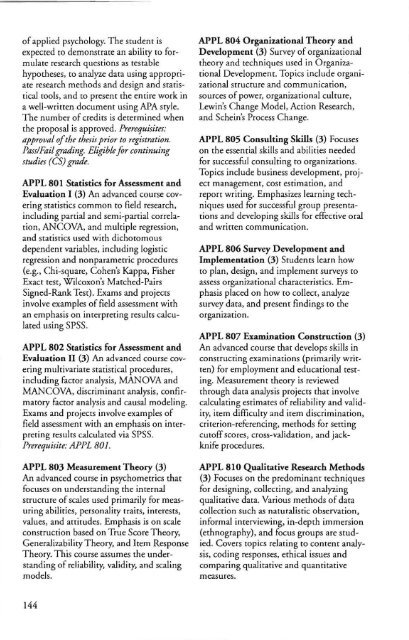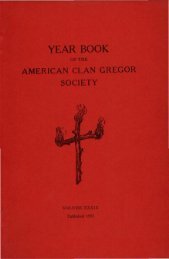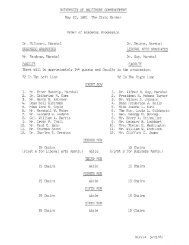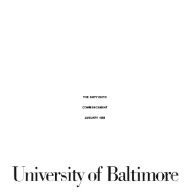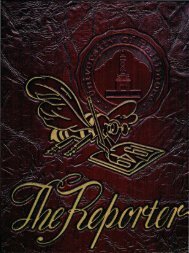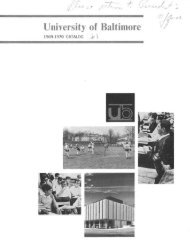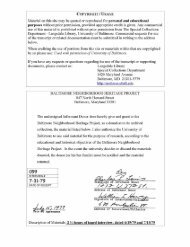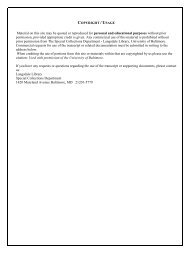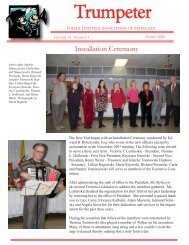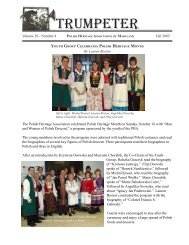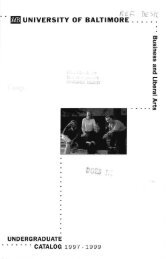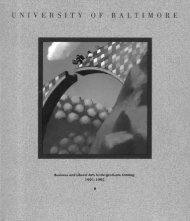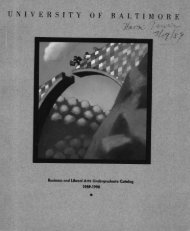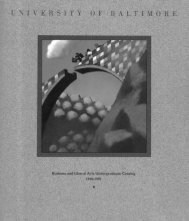2003-2005 - Special Collections - University of Baltimore
2003-2005 - Special Collections - University of Baltimore
2003-2005 - Special Collections - University of Baltimore
You also want an ePaper? Increase the reach of your titles
YUMPU automatically turns print PDFs into web optimized ePapers that Google loves.
<strong>of</strong> applied psychology. The student is<br />
expected to demonstrate an ability to formulate<br />
research questions as testable<br />
hypotheses, to analyze data using apptOpriate<br />
research methods and design and statistical<br />
tOols, and to present the entire work in<br />
a well-written document using APA style.<br />
The number <strong>of</strong> credits is determined when<br />
the proposal is approved. Prerequisites:<br />
approval <strong>of</strong>the thesis prior to registration.<br />
Pass/Failgrading. Eligible for continuing<br />
studies (eS) grade.<br />
APPL 801 Statistics for Assessment and<br />
Evaluation I (3) An advanced course covering<br />
statistics common to field research,<br />
including partial and semi-partial correlation,<br />
ANCOVA, and multiple regression,<br />
and statistics used with dichotomous<br />
dependent variables, including logistic<br />
regression and nonparametric procedures<br />
(e.g., Chi-square, Cohen's Kappa, Fisher<br />
Exact test, Wilcoxon's Matched-Pairs<br />
Signed-Rank Test). Exams and projects<br />
involve examples <strong>of</strong> field assessment with<br />
an emphasis on interpreting results calculated<br />
using SPSS.<br />
APPL 802 Statistics for Assessment and<br />
Evaluation II (3) An advanced course covering<br />
multivariate statistical procedures,<br />
including factOr analysis, MANOVA and<br />
MANCOVA, discriminant analysis, confirmatOty<br />
factor analysis and causal modeling.<br />
Exams and projects involve examples <strong>of</strong><br />
field assessment with an emphasis on interpreting<br />
results calculated via SPSS.<br />
Prerequisite: APPL 801.<br />
APPL 803 Measurement Theory (3)<br />
An advanced course in psychometrics that<br />
focuses on understanding the internal<br />
structure <strong>of</strong> scales used primarily for measuring<br />
abilities, personality traits, interests,<br />
values, and attitudes. Emphasis is on scale<br />
construction based on True Score Theory,<br />
GeneralizabilityTheory, and Item Response<br />
Theory. This course assumes the understanding<br />
<strong>of</strong> reliability, validity, and scaling<br />
models.<br />
144<br />
APPL 804 Organizational Theory and<br />
Development (3) Survey <strong>of</strong> organizational<br />
theory and techniques used in Organizational<br />
Development. Topics include organizational<br />
structure and communication,<br />
sources <strong>of</strong> power, organizational culture,<br />
Lewin's Change Model, Action Research,<br />
and Schein's Process Change.<br />
APPL 805 Consulting Skills (3) Focuses<br />
on the essential skills and abilities needed<br />
for successful consulting to organizations.<br />
Topics include business development, project<br />
management, cost estimation, and<br />
report writing. Emphasizes learning techniques<br />
used ror successful group presentations<br />
and developing skills for effective oral<br />
and written communication.<br />
APPL 806 Survey Development and<br />
Implementation (3) Students learn how<br />
to plan, design, and implement surveys to<br />
assess organizational characteristics. Emphasis<br />
placed on how to collect, analyze<br />
survey data, and present findings to the<br />
organization.<br />
APPL 807 Examination Construction (3)<br />
An advanced course that develops skills in<br />
constructing examinations (primarily written)<br />
for employment and educational testing.<br />
Measurement theory is reviewed<br />
through data analysis projects that involve<br />
calculating estimates <strong>of</strong> reliability and validity,<br />
item difficulty and item discrimination,<br />
criterion-referencing, methods for setting<br />
cutOff scores, cross-validation, and jackknife<br />
procedures.<br />
APPL 810 Qualitative Research Methods<br />
(3) Focuses on the predominant techniques<br />
for designing, collecting, and analyzing<br />
qualitative data. Various methods <strong>of</strong> data<br />
collection such as naturalistic observation,<br />
informal interviewing, in-depth immersion<br />
(ethnography), and focus groups are studied.<br />
Covers tOpics relating to content analysis,<br />
coding responses, ethical issues and<br />
comparing qualitative and quantitative<br />
measures.


